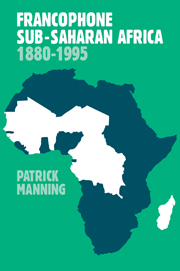Book contents
- Frontmatter
- Contents
- List of illustrations
- Acknowledgments
- Note on the second edition
- Map 1 Francophone sub-Saharan Africa in 1995
- 1 Prologue
- 2 Economy and society, 1880–1940
- 3 Government and politics, 1880–1940
- 4 Culture and religion, 1880–1940
- 5 Economy and society, 1940–1985
- 6 Government and politics, 1940–1985
- 7 Culture and religion, 1940–1985
- 8 Democracy and dependence, 1985–1995
- 9 Epilogue
- Bibliographical essay
- Index
5 - Economy and society, 1940–1985
Published online by Cambridge University Press: 12 January 2010
- Frontmatter
- Contents
- List of illustrations
- Acknowledgments
- Note on the second edition
- Map 1 Francophone sub-Saharan Africa in 1995
- 1 Prologue
- 2 Economy and society, 1880–1940
- 3 Government and politics, 1880–1940
- 4 Culture and religion, 1880–1940
- 5 Economy and society, 1940–1985
- 6 Government and politics, 1940–1985
- 7 Culture and religion, 1940–1985
- 8 Democracy and dependence, 1985–1995
- 9 Epilogue
- Bibliographical essay
- Index
Summary
Between 1939 and 1942 Europe and Asia were engulfed in a war which extended to all the oceans of the world and to North Africa. Africa had undergone a foretaste of the war with the Italian conquest of Ethiopia in 1935–36. This was the last colonial conquest, but it was also a stepping stone to World War II. The course of the war resulted, in part, in the isolation of francophone sub-Saharan Africa, as the main battles and supply lines lay elsewhere. In another sense, the war and its aftermath resulted in a deeper integration of francophone Africa into the world community. The Allied victory over the Axis powers of Germany, Italy, Japan and their allies was widely interpreted as a victory for democracy and human rights, and as a rejection of fascism, of racial discrimination and persecution, and of the conquest of territory by military might. Africans came to the end of the war with hopes that they might gain equality with other peoples in political rights, in social standing, and in economic conditions. The formation of the United Nations in 1945 and its adoption of a Declaration of Human Rights in 1947 gave further reason for such hope, as did the 1947 achievement of independence from British colonial rule by India and Pakistan.
In the French colonies, the aftermath of the war led to the granting of new political rights. African voters were enabled to elect representatives to territorial councils and to the French National Assembly. These representatives led in the 1946 abolition of forced labor in France's African colonies, and fueled the hope for a new and better colonial system.
- Type
- Chapter
- Information
- Francophone Sub-Saharan Africa 1880–1995 , pp. 110 - 132Publisher: Cambridge University PressPrint publication year: 1999



